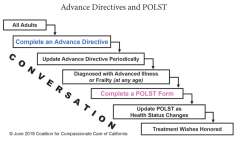

Advance Care Planning isn’t just for people who are getting older. It is important for all adults to plan for future medical needs now because a serious accident or illness can happen at any age.
Learn more about.
Advance Care Planning helps adults at any age or stage of health understand and share their personal values, life goals, and preferences regarding future medical care. It is a gift you give your loved ones who might otherwise struggle during a medical emergency to make choices about your care.
Advance Care Planning is not a single decision; it is a process that occurs over a lifetime as goals and values change. Steps in the Advance Care Planning process include:

Ideally, Advance Care Planning begins in early adulthood with the completion of an Advance Directive and the naming of a health care agent. Your Advance Directive should then be reviewed and updated periodically throughout your life.
If you are diagnosed with a serious or chronic, progressive illness at any age, talk with your primary care provider about your treatment goals. If your goals include a preference for less aggressive treatment based on your current health condition, then completing a POLST form might be appropriate. The goal of Advance Care Planning is to ensure that your treatment wishes are known and honored.
Learn more about your rights to make medical decisions.
Advance Directive Forms
When most people think about Advance Care Planning, they think about completing an Advance Directive, also known as an advance healthcare directive. The law does not define which Advance Directive form you should use, just that the form includes some specific elements and instructions.
The standard Advance Directive form in California allows a person to do either or both:
Take note: Naming a power of attorney for health care is different from naming a financial or fiduciary power of attorney (someone who manages your finances). The two require different processes and forms.
A variety of Advance Directive formats are available. The following Advance Directive form meets California’s requirements:
For those who prefer a simpler form, an easy-to-read California Advance Directive called Prepare for Your Care is available in multiple languages with step-by-step instructions.
Other Advance Directive forms are specific to selected circumstances such as:
Many of these can be found on the Coalition for Compassionate Care of California website.
Note that not all Advance Directives are recognized by all states. Please check your state requirements before completing your Advance Directive.
No one knows the future, but we can try to plan for it. For example, we have car insurance to protect us financially in case we get in an accident. When it comes to medical issues, most of us are used to making our own decisions regarding medical treatments we want or don’t want. Unfortunately, a serious illness or injury can suddenly make it impossible for us to communicate our wishes, and leave our doctors and loved ones guessing. Advance Care Planning can help us avoid putting this unnecessary burden on our loved ones and allows us to maintain some control over the care we receive. It allows physicians and families to feel confident that medical decisions are based on the goals and values of the patient, even when that person can’t speak in that moment.
Medical care is always improving. New medical technologies and advancements in care allow medical professionals to effectively treat more conditions and potentially cure more diseases. But these same medical advancements can sometimes result in treatment that goes beyond what the patient wants. This can be avoided when care is aligned with the patient’s goals.
When physicians understand people's goals, they can recommend the medical treatments most likely to achieve those goals. When patients are not able to speak for themselves, their health care agent and others speaking on their behalf can confidently work with the medical team to fine-tune treatment choices to meet the patient's goals.
That is why Advance Care Planning focuses less on specific treatments, and more on the person’s values and goals for living. It's not so much about what the treatment does, as it is about what the treatment might mean for the patient's health or way of life. By focusing on the patient’s goals, the physician can recommend a treatment strategy most likely to help achieve those goals. See the Conversation example for more details.
Anyone over 18 years of age can and should complete an Advance Directive. Conversations about Advance Care Planning should be part of routine medical care because anyone can fall victim to a serious illness or injury.
Completing an Advance Directive becomes even more important for people with serious medical conditions, and for people with advanced illness or those at higher risk of losing their decision-making ability, Advance Care Planning becomes a critical need.
While Advance Care Planning is sometimes done during estate planning, it is not necessary to hire an attorney to complete an Advance Directive.
You need an Advance Directive if:
What to Think About When Completing an Advance Directive
As you are preparing to complete an Advance Directive, you should think about:
A health care agent that you name in your Advance Directive has the authority to make nearly all medical decisions you would make if you were able, including:
The health care agent’s role is to be your voice – not to make decisions based on their own wishes. You should talk to your agent about your wishes so he/she knows how to speak for you. The more you tell your agent, the better he/she will be able to help make decisions as you would make them yourself, if you were able.
Your health care agent should be someone who knows you well, someone you trust to follow your instructions and who is willing and able to act as your decision maker. It cannot be your health care provider or someone who works for your health care provider.
In choosing an agent, consider if he/she:
It is important to talk to your health care agent to be sure they understand your wishes and are comfortable in carrying them out if the need arises. Talking to family members and telling them whom you have chosen as your agent and why can help prevent family conflict during an emergency.
A legally valid Advance Directive must meet the following requirements:
If these requirements are not met, information in the Advance Directive might still be used to guide care, but the document might not stand up if there is a legal challenge.
Signing and Witnesses
Your Advance Directive isn’t considered legal until it is signed by you in the presence of two qualified witnesses OR a notary agent. Qualified witnesses are:
The witnesses are validating that you are the person signing the document; they do not need to read or agree with the content of your Advance Directive.
If you are living in a California nursing home, one of the witnesses must be a patient advocate or ombudsman.
One of the most important things to remember about your Advance Directive is that it is not a secret document. Unlike a will, which might be locked in a drawer or stored in a safe, your Advance Directive should be kept in a place where it can be easily found if it is needed. In fact, it is a good idea to make multiple copies.
For more information about Advance Directives, ask your doctor, nurse or social worker for assistance. If you have any questions about completing an Advance Directive form, or if you need an Advance Directive form, you may contact the Office of Patient Experience 310-267-9113 for inpatients, or 310-794-1276 for ambulatory care patients. You may also ask your health provider for additional written material.